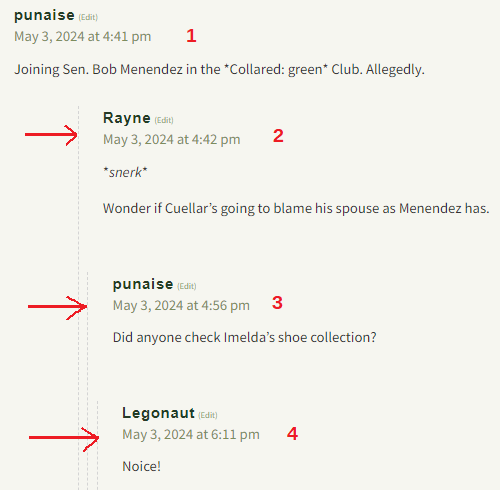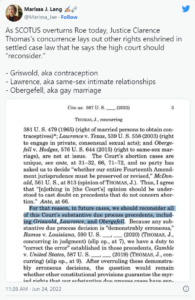Happy (Forced) Mother’s Day!
[NB: check the byline, thanks. /~Rayne]
Hope all of the mothers in our community are having a restful Sunday, whether mothers in fact or mothers of invention.
Not wishing a happy day to this senator, however.
Remember this GOP senator’s freakish fundie-speak rebuttal to President Biden’s State of the Union? She’s back with an attempt to move this country ever closer to Gilead of The Handmaid’s Tale.
She and 13 co-sponsors — Sen. Rubio (R-FL), Sen. Cramer (R-ND), Sen. Daines (R-MT), Sen. Grassley (R-IA), Sen. Hyde-Smith (R-MS), Sen. Marshall (R-KS), Sen. Moran (R-KS), Sen. Ricketts (R-NE), Sen. Rounds (R-SD), Sen. Schmitt (R-MO), Sen. Tillis (R-NC), Sen. Wicker (R-MS), and Sen. Lankford (R-OK) — submitted S.4296, the “More Opportunities for Moms to Succeed Act,” a.k.a. the “MOMS Act” this past week.
As Salon and the Guardian reported, the bill creates a database which allows the federal government to track persons who use a government-developed and hosted website, “pregnancy.gov,” while seeking information and resources related to pregnancy.
The bill may initially look innocuous to those who aren’t familiar with how websites work, but one doesn’t have to read very deeply to see this is horrifying:
11 “(a) WEBSITE. — Not later than 1 year after the date
12 of enactment of this section, the Secretary shall publish
13 a public website entitled ‘pregnancy.gov’. The Secretary
14 may not delegate implementation or administration of the
15 website below the level of the Office of the Secretary. The
16 website shall include the following:
17 “(1) A clearinghouse of relevant resources
18 available for pregnant and postpartum women, and
19 women parenting young children.[page] 3
1 “(2) A series of questions through which a user
2 is able to generate a list of relevant resources of in-
3 terest within the user’s zip code.
4 “(3) A means to direct the user to identify
5 whether to list the relevant resources of interest that
6 are available online or within 1, 5, 10, 50, and 100
7 miles of the user.
8 “(4) A mechanism for users to take an assess-
9 ment through the website and provide consent to use
10 the user’s contact information, which the Secretary
11 may use to conduct outreach via phone or email to
12 follow up with users on additional resources that
13 would be helpful for the users to review.
The server on which the website is hosted would capture the user’s IP address. That’s normal for all web servers. Because we don’t have a national standard curriculum for computers and networks, the average American will not understand they shed this information whenever they visit any website.
If the prospective user then seeks any resource near them, they may not only validate their physical location but pregnancy or postpartum status.
Someone from Health and Human Services could follow up with them — *shudder* — although the bill gives a weak nod to consent.
If they speak other than English — think asylum seekers here — their ethnic/national identity might be deduced by this bit on page 5 of the bill:
3 “(d) SERVICES IN DIFFERENT LANGUAGES.— The
4 Secretary shall ensure that the website provides the widest
5 possible access to services for families who speak lan-
6 guages other than English.
Worse, all this data will be reported to Congress:
7 “(e) REPORTING REQUIREMENTS.—
8 “(1) IN GENERAL.— Not later than 180 days
9 after the date on which the website is established
10 under this section, the Secretary shall submit to
11 Congress a report on—
12 “(A) the traffic of the website;
13 “(B) user feedback on the accessibility and
14 helpfulness of the website in tailoring to the
15 user’s needs;
16 “(C) insights on gaps in relevant resources
17 with respect to services for pregnant and
18 postpartum women, or women parenting young
19 children;
20 “(D) suggestions on how to improve user
21 experience and accessibility based on user feed-
22 back and missing resources that would be help-
23 ful to include in future updates; and[page] 6
1 “(E) certification that no prohibited enti-
2 ties are listed as a relevant resource or are in
3 receipt of a grant under subsection (b)(3).
4 “(2) CONFIDENTIALITY.— The report under
5 paragraph (1) shall not include any personal identi-
6 fying information regarding individuals who have
7 used the website.
The confidentiality requirement is a fucking joke. Once this data is released to Congress, it’d be far too easy to hunt down the users. It’s yet another opportunity to breach users’ privacy, just like every other website and application for any purpose.
There’s nothing helpful about this at all. It’s a means to allow the federal government directly into women’s uteruses across the country, not exactly small government.
This also blows away the idea of states’ rights when it comes to regulating reproductive rights, though the states are supposed to provide the contact information of approved Gilead resources to be offered through this national website. If states want to offer pregnancy or postpartum resources they can do that through state health departments. They don’t need the feds harvesting this data in a central repository.
The really aggravating part about this bill? The creation of yet more federal and state government bureaucracy intended to get deep into mothers’ and prospective mothers’ crotches, while a non-governmental solution has existed for years with federal support through block grants, eventually suppressed by far-right anti-reproductive rights lawmakers and the orange hellbeast.
Maybe you’ve even heard of it before — it’s a national nonprofit called Planned Parenthood.
~ ~ ~
Comment Operations Note
You may have noticed a change in the comments system this week. After many complaints about comments being unreadable after fourth or fifth reply to a reply to a comment especially on mobile devices, the maximum width of threaded nested comments has been set to four.
In other words, this is what will be permitted as seen on a desktop:
A fifth reply to the fourth comment in this thread will not see a Reply button.
If you wish to leave a reply to that fourth comment, preface the comment with the user’s name and date/time of the comment to which you wish to reply. You can also pick up the link to that comment by right-clicking on the date/time and then pasting into the preface of your reply. Example:
Rayne (edit)
Reply to Legonaut, May 3, 2024 at 6:11 pm
Nice or Noise?
Not an actual reply in that thread, just an example of how to leave a fifth-wide comment and what it will look like.
Will it slow your comments down? Sorry, yes, it may, but if you really feel compelled to share a comment this is a trade-off for readability. What good is your comment if it can’t be read by a substantial portion of the EW community?
I should also add here that wordy comments lacking concision have also helped force this change. You know who you are; think more about your audience here because even at four wide, some comments will still be challenging on mobile devices. Under the previous setting, those overlong comments acted like a Denial of Service to other readers.
There will be more changes to comments in the near future, though a couple tweaks to the righthand sidebar will happen first. Watch for them.
~ ~ ~
Treat this as an open thread.






![Magic8Ball_AndresRueda-Flickr_mod1 [adapted: Magic 8-Ball by Andres Rueda via Flickr]](http://www.emptywheel.net/wp-content/uploads/2012/12/Magic8Ball_AndresRueda-Flickr_mod1-282x300.jpg)